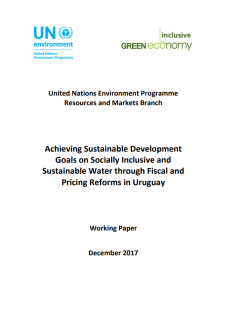
This report, Achieving Sustainable Development Goals on Socially Inclusive and Sustainable Water through Fiscal and Pricing Reforms in Uruguay, explores fiscal policies for agricultural uses of water resources in Uruguay and carries out a modelling exercise to analyse the impacts of agricultural water use charges.
A recent constitutional reform in Uruguay acknowledges water as a fundamental right and a new institutional set-up on water issues has been established. In July 2016 a participatory process of drafting the National Water Plan was launched. One of the main proposed actions in the plan is the introduction of agricultural usage charges and contamination fees to raise revenues, increase water-use efficiency, and improve water quality.
This analysis finds that introducing an agricultural water fee would impact costs to producers, which can have implications both on the amount of water per hectare produced as well as on the acreage irrigated. The introduction of the fee will also increase the state’s revenue collection. Further analysis of the proposed agricultural water charge in Uruguay would provide policymakers with a better basis to apply the charges.
